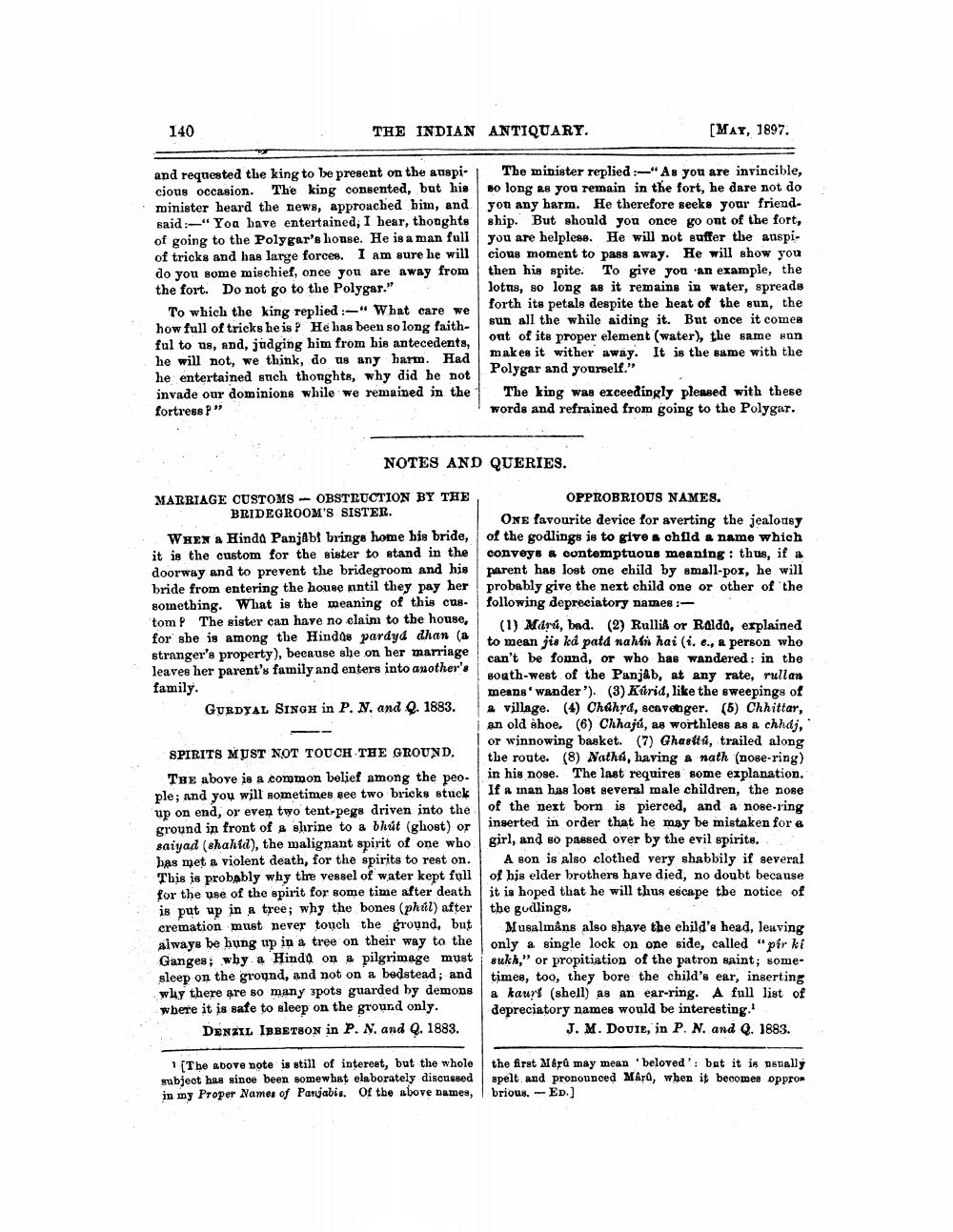________________
140
and requested the king to be present on the auspicious occasion. The king consented, but his minister heard the news, approached him, and said:"You have entertained, I hear, thoughts of going to the Polygar's house. He is a man full of tricks and has large forces. I am sure he will do you some mischief, once you are away from the fort. Do not go to the Polygar."
THE INDIAN ANTIQUARY.
To which the king replied:-" What care we how full of tricks he is? He has been so long faithful to us, and, judging him from his antecedents, he will not, we think, do us any harm. Had he entertained such thoughts, why did he not invade our dominions while we remained in the fortress ?"
-
MARRIAGE CUSTOMS OBSTRUCTION BY THE BRIDEGROOM'S SISTER.
NOTES AND QUERIES.
WHEN a Hinda Panjabi brings home his bride, it is the custom for the sister to stand in the doorway and to prevent the bridegroom and his bride from entering the house until they pay her something. What is the meaning of this custom? The sister can have no claim to the house,
for she is among the Hindas pardyd dhan (a stranger's property), because she on her marriage leaves her parent's family and enters into another's family.
GURDYAL SINGH in P. N. and Q. 1883.
[MAY, 1897.
The minister replied:-"As you are invincible, so long as you remain in the fort, he dare not do you any harm. He therefore seeks your friendship. But should you once go out of the fort, you are helpless. He will not suffer the auspicious moment to pass away. He will show you then his spite. To give you an example, the lotus, so long as it remains in water, spreads forth its petals despite the heat of the sun, the sun all the while aiding it. But once it comes out of its proper element (water), the same sun makes it wither away. It is the same with the Polygar and yourself."
SPIRITS MUST NOT TOUCH THE GROUND,
THE above is a common belief among the people; and you will sometimes see two bricks stuck up on end, or even two tent-pegs driven into the ground in front of a shrine to a bhút (ghost) or saiyad (shahid), the malignant spirit of one who has met a violent death, for the spirits to rest on. This is probably why the vessel of water kept full for the use of the spirit for some time after death is put up in a tree; why the bones (phil) after cremation must never touch the ground, but always be hung up in a tree on their way to the Ganges; why a Hindo on a pilgrimage must sleep on the ground, and not on a bedstead; and why there are so many spots guarded by demons where it is safe to sleep on the ground only.
DENZIL IBBETSON in P. N. and Q. 1883.
[The above note is still of interest, but the whole subject has since been somewhat elaborately discussed in my Proper Names of Panjabis. Of the above names,
The king was exceedingly pleased with these words and refrained from going to the Polygar.
OPPROBRIOUS NAMES.
ONE favourite device for averting the jealousy of the godlings is to give a child a name which conveys a contemptuous meaning: thus, if a parent has lost one child by small-pox, he will probably give the next child one or other of the following depreciatory names :
(1) Márú, bad. (2) Rulli or Raldo, explained to mean jis ka pata nahin hai (i. e., a person who can't be found, or who has wandered: in the south-west of the Panjab, at any rate, rullan means' wander'). (3) Kúrid, like the sweepings of a village. (4) Chahrá, scavenger. (5) Chhittar, an old shoe. (6) Chhajú, as worthless as a chháj, or winnowing basket. (7) Ghastú, trailed along the route. (8) Natha, having a nath (nose-ring) in his nose. The last requires some explanation. If a man has lost several male children, the nose
of the next born is pierced, and a nose-ring inserted in order that he may be mistaken for a girl, and so passed over by the evil spirits.
A son is also clothed very shabbily if several of his elder brothers have died, no doubt because it is hoped that he will thus escape the notice of the godlings,
Musalmans also shave the child's head, leaving only a single lock on one side, called "pir ki sukh," or propitiation of the patron saint; sometimes, too, they bore the child's ear, inserting a kaurt (shell) as an ear-ring. A full list of depreciatory names would be interesting.'
J. M. DOUIE, in P. N. and Q. 1883.
the first Marû may mean 'beloved': but it is usually spelt and pronounced Marû, when it becomes oppro brious. ED.]




